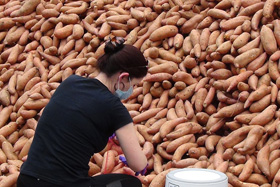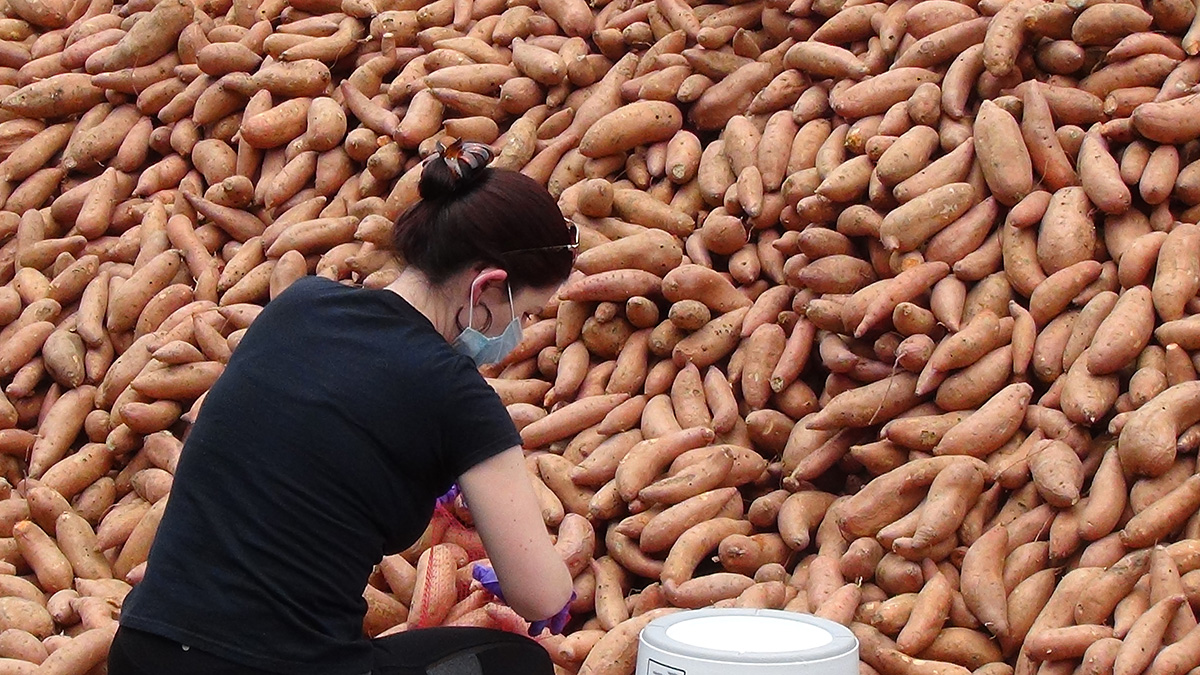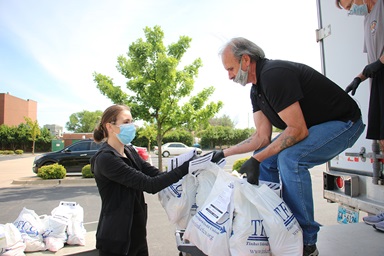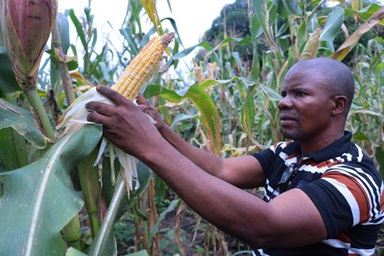Editor’s note: This is the final story in a three-part series.
Few have a better perspective of the dynamics of food insecurity and food waste — before and during the coronavirus pandemic — than the staff at the Society of St. Andrew.
For 40 years, the United Methodist-supported nonprofit hunger-relief ministry, based in Big Island, Virginia, has “rescued” produce and other food through a direct connection with farmers, feeding agencies and armies of volunteers from churches, schools, camps and other groups.
It is a continuing effort to reclaim some of the 40%-50% of U.S. produce that went to waste because of a flawed food system even before the pandemic, said Jean Blish Siers, the society’s Carolinas program coordinator in a blog post.
“What the pandemic has done has exposed those cracks in the system that have been there all along,” she told UM News.
Addressing food insecurity

Volunteer Elyssa Bollinger packages gleaned sweet potatoes for distribution to local residents during a socially distanced Society of St. Andrew “potato drop” at First United Methodist Church in Mt. Olive, N.C. Photo by Michael Binger, Society of St. Andrew.
Food-related ministries, a mainstay of United Methodist mission work, have provided a way for the church to respond to food access problems created by the coronavirus pandemic and the continuing economic effects of the crisis.
Why is food being dumped when there seem to be shortages on grocery store shelves? In an April 21 letter to donors, Lynette Johnson, executive director of the Society of St. Andrew, explained that those temporary gaps are due to more demand as people eat more meals at home “but the food continues to flow from farms to packing houses to distribution centers to stores to you.”
So while that retail track is still functioning and smaller family farms have been able to adapt during the pandemic, the commercial food track has experienced a significant drop in demand, she wrote. And it’s hard to re-route that track.
A small amount of the food produced for commercial use has been donated to the Society of St. Andrew. A recent story in the Washington Post detailed a gleaning visit to Hank Scott, a farmer in Mount Dora, Florida, with a glut of cucumbers. The coronavirus pandemic had closed or crippled the businesses where his produce would end up, the article pointed out.
“It was natural that his first call was to us,” Johnson said.
In fact, the food rescue ministry saw a 55% increase in produce distribution this April, compared to April 2019. That accounted for 2.6 million pounds — or 7.8 million servings — of produce last month compared to 1.68 million pounds — or 5 million servings — in April 2019.
“That's not purely COVID-response driven, since weather issues hampered our efforts in April 2019,” Johnson noted. A better comparison might be to April 2018, she said, when 2 million pounds of produce were distributed.
The volunteer model for gathering and distribution also has changed during the pandemic.
In normal times, explained Bill Leach, director of operations, a rescue involving 40,000 pounds of potatoes would find those potatoes dumped into a giant pile on the ground, spread out in a 60-foot path. Then 50 to 75 volunteers would circle around and gather the potatoes into 10-pound bags, which would be taken to a location where the bags would be loaded onto the trucks of various food agencies.
Subscribe to our
e-newsletter
Like what you're reading and want to see more? Sign up for our free daily and weekly digests of important news and events in the life of The United Methodist Church.
A backhoe on loan from the town scooped the loose sweet potatoes directly into the beds of waiting pick-up trucks bound for an assortment of feeding agencies and churches with food pantries. A few volunteers chased runaway potatoes while a line of residents who had walked up from the neighborhood stood six feet apart, waiting for a bag to take home.
The drop was one of five made at United Methodist churches in the state in early May, assisted by mission money from the denomination’s North Carolina Conference.
Overseeing the action at Mt. Olive was the Rev. Michael Binger, the society’s regional director for the Carolinas and a part-time pastor at the church.
“One of the town commissioners who is in our church particularly serves the most economically poor neighborhoods in town,” Binger said. “She went through and helped us spread word that potatoes were coming that day. We probably had 50 to 60 people come out.”
Partner agencies have had a 200% to 800% increase in requests for help during the pandemic, Binger said, so they were pleased to have shelf stable, nutritious produce like sweet potatoes to give out. “It is everything they can do to just be keeping up,” he added.
“What we’ve mainly been scheduling are these large loads that have been available to us more often since mid-March.”
The trick is to organize a produce drop in a way that minimizes the risk of spreading the coronavirus. “That really has been our mantra,” Binger explained. “How do we maximize our good without doing harm to anybody at any part in the process.”
One challenge, Johnson said, is to protect the farmers as much as possible so they are not donating food that could otherwise be sold. “We find just time and time again that farmers are incredibly generous,” she added.
Another avenue of support for the Society of St. Andrew is the connection with United Methodists, including grants from the Board of Global Ministries. “Every year they’ve given us more than we’ve asked for,” Johnson said. “We’re just really grateful for this longstanding partnership with The United Methodist Church.”
“I have been blown away by the expressions of grace from people at all levels,” said Binger, who also saluted struggling farmers who still want to help by offering food for others.
“It’s heartening to see so many people concerned about food waste and the struggles of the agricultural system,” Siers concluded in her blog. “I hope we remember that our neighbor’s struggle can easily become our struggle, as it has for so many this year.”
Bloom is the assistant news editor for United Methodist News Service and is based in New York.
Follow her at https://twitter.com/umcscribe or contact her at 615-742-5470 or newsdesk@umcom.org. To read more United Methodist news, subscribe to the free daily or weekly digests.
Like what you're reading? Support the ministry of UM News! Your support ensures the latest denominational news, dynamic stories and informative articles will continue to connect our global community. Make a tax-deductible donation at ResourceUMC.org/GiveUMCom.




